Several Details About Violent Men and Their Artists
West Coast Blues
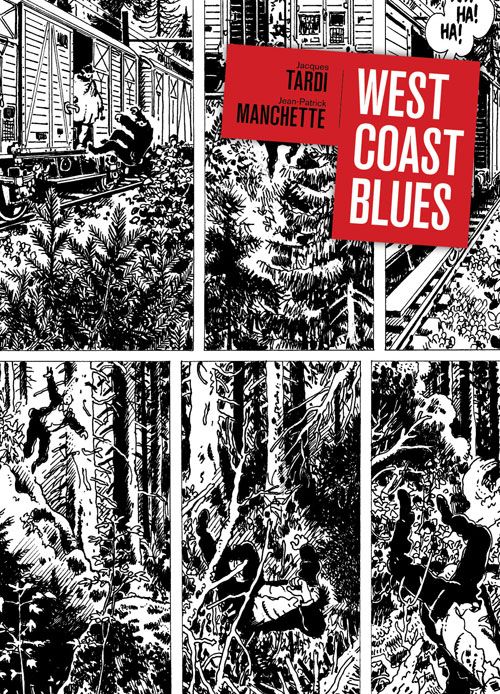
This should be out in a few weeks; maybe October, just as the year lunges into its final quarter. It's becoming clear that these late months of 2009 will register as something of a prime time for well-tooled pop comics from outside the North American superhero sphere, from the ultra-slick crime fiction transubstantiation of Darwyn Cooke's The Hunter , courtesy of IDW, to the honed and ready scratch attack of Johnny Ryan's forthcoming Prison Pit, published by Fantagraphics, the same folks behind this smart-looking 80-page hardcover, $18.99.
But let's get back to Darwyn Cooke for a minute, because this is a crime comic too. In fact, it's a comics adaptation of a prominent prose novel by a beloved crime writer, concieved as a period piece of the era in which the novel was written, concerning a stoic-looking antihero who loses everything, vanishes for a while, holds steady onto some cunning, then restores himself to prosperity via the shooting of motherfuckers that need it. Both books contain framing images of Our Man on the road, a socio-economic subtext, and a dénouement that nod toward the inscrutability of these hard men and their achievements. You'd swear this was a response to Cooke's book, if you didn't know it was an English translation of a French album from 2005.
And anyway, being a comic by Jacques Tardi, it has plenty of baggage all its own.
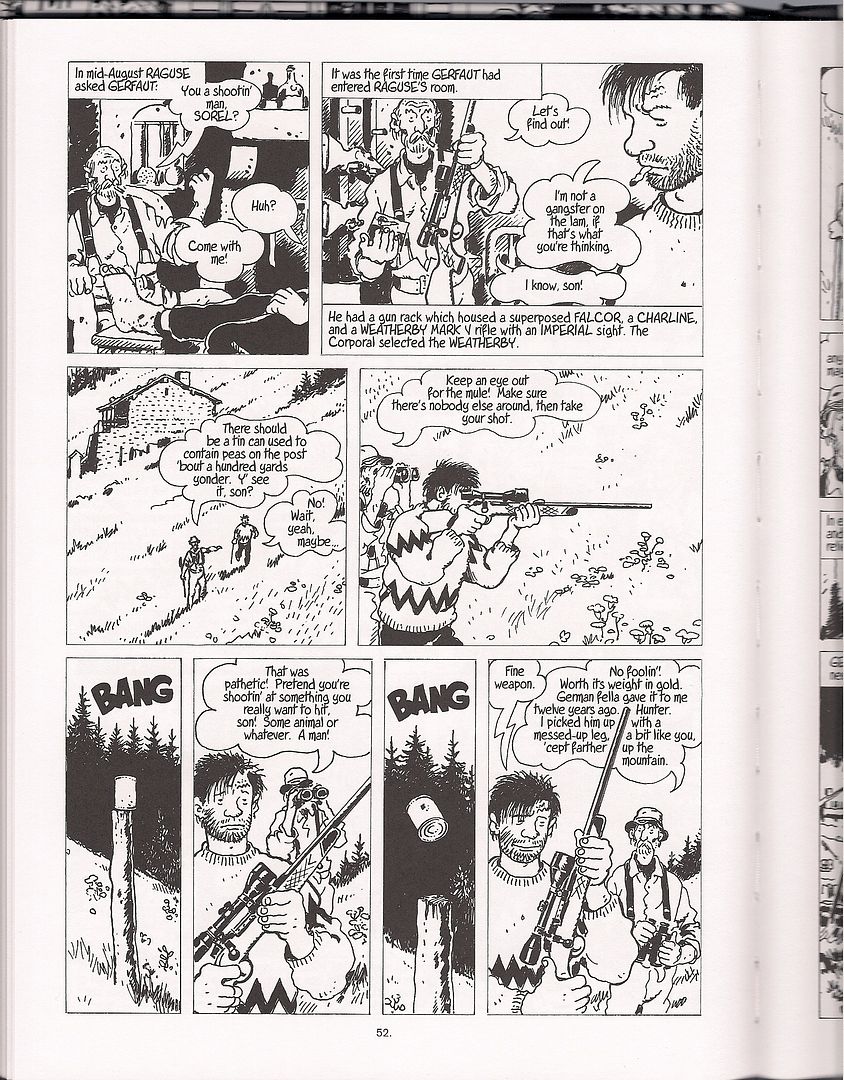
West Coast Blues marks the start of Fantagraphics' new Tardi publishing effort, the latest iteration of a ongoing, multi-publisher effort to 'break' the artist onto the American scene that's lasted essentially since the dawn of the Direct Market. It's a rare artist that can claim OG status with both RAW and Heavy Metal, but Tardi's been from there to Cheval Noir to Fantagraphics' miscellaneous house anthologies of the '90s, all the way down to the early days of the new bookshelf comics boom in the 21st century.
That last bit was iBooks' sadly limited 2003 release of The Bloody Streets of Paris, a 1988 adaptation of French mystery giant Léo Malet's 1943 occupation detective novel 120, rue de la Gare. An earlier Tardi take on a Malet novel was serialized in one of the aforementioned Fantagraphics anthologies, Graphic Fiction Monthly. Shortly thereafter, the publisher's Pictopia anthology serialized Tardi's Griffu, an early work, from 1978, scripted by roman noir superstar Jean-Patrick Manchette. Two years prior, Manchette had published the novel Le Petit bleu de la côte Ouest (available in English from City Lights Books as 3 to Kill), which director Jacques Deray loosely adapted to the cinema in 1980 as Trois hommes à abattre, starring the great Alain Delon. And then Tardi made a comic out of it - the book we're talking about here, since things do tend to come around.
We're told in the back of Fantagraphics' edition -- Kim Thompson edits and translates -- that Manchette was a lifelong comics reader. Indeed, he also co-wrote the 1982 René Laloux/Moebius movie animation extravaganza Time Masters, and translated Watchmen to French. Among his other translations were some prose novels by Donald E. Westlake, aka Richard Stark, author of The Hunter. Later of Darwyn Cooke's comics rendition, naturally.
And to look at Cooke's take on Stark is to admire the surface. His characters are composed as polished cartoon designs, stiffly to some eyes. Sickly steel-gray monochome darkens tasteful high-'50s environments, an art directed dream. That's allegorical: the story of vengeful super-crook Parker is dabbed with parody of bourgeois economic combat, its wicked syndicate men behaving like a good American corporation, stripping solo entrepreneur Parker of his business 'till he's up by his bootstraps and back in the fight. He might be a little sad that his lover died, sure, but it's the money that hurt worse, and it's money he gets back.
You don't have to like how it looks, of course; I can understand readers finding Cooke's pages stiff, stilted, distant, boring, etc. But there is a real concept behind his swoony catalog decor, one that adds a hint of self-consciousness to his wholesale adoption of the novel's brutish way with women and goons, married to a distinct coyness with gore and sex. In this world, nary a hair is out of place unless it's necessary. A man's skull getting blown out the back if his seat leaves no more blood than a show-dressed mannequin in the same unlucky position.
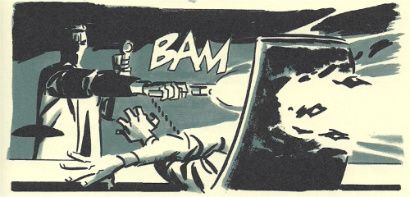
(from The Hunter)
Tardi is totally different. If there was a licensing board for living legends of Eurocomics they'd waive his examination. He's made some beloved classics, sure -- Fantagraphics is publishing two of them next, 1979's surreal satire You Are Here (Ici Même, written by Jean-Claude Forest) and 1993's WWI human patchwork It Was the War of the Trenches (excerpts previously seen in Drawn and Quarterly) -- but it's especially good that this high-profile release is recent, and without the weight of expectation.
From this it's easy to see he's gotten like Tezuka. His character designs look as dashed-out natural as his own signature, happily riffing on his own prior work; the book's protagonist looks remarkably like Nestor Burma, from Tardi's Malet mysteries. The style also brings to mind Tardi's obvious aesthetic descendant, Guy Davis, in his handmade backgrounds growing out of scribbles and squiggles and doodled background personae into full-formed locations, all taken from Manchette's France of 1976 and 1977.
As a result, Tardi's places not only compliment his characters but seem grown right out of them. And these soft cartoon people gawk and undress and bleed in ways disallowed by Darwyn Cooke and Parker. Their world is pulsing with living activity and active frailty, and some exaggeration - when someone gets shot in the head here their skull literally explodes in a goosh of black matter, a stray ear bouncing away like a gag strip punchline. Cooke's frosty composure, the law of his mid-century status quo, gives way to Tardi's loose look of chaos. Parker is the perfect operator of a perfect cruel machine, while Mr. George Gerfaut, electric component salesman, must rise higher to cope with a capricious world.
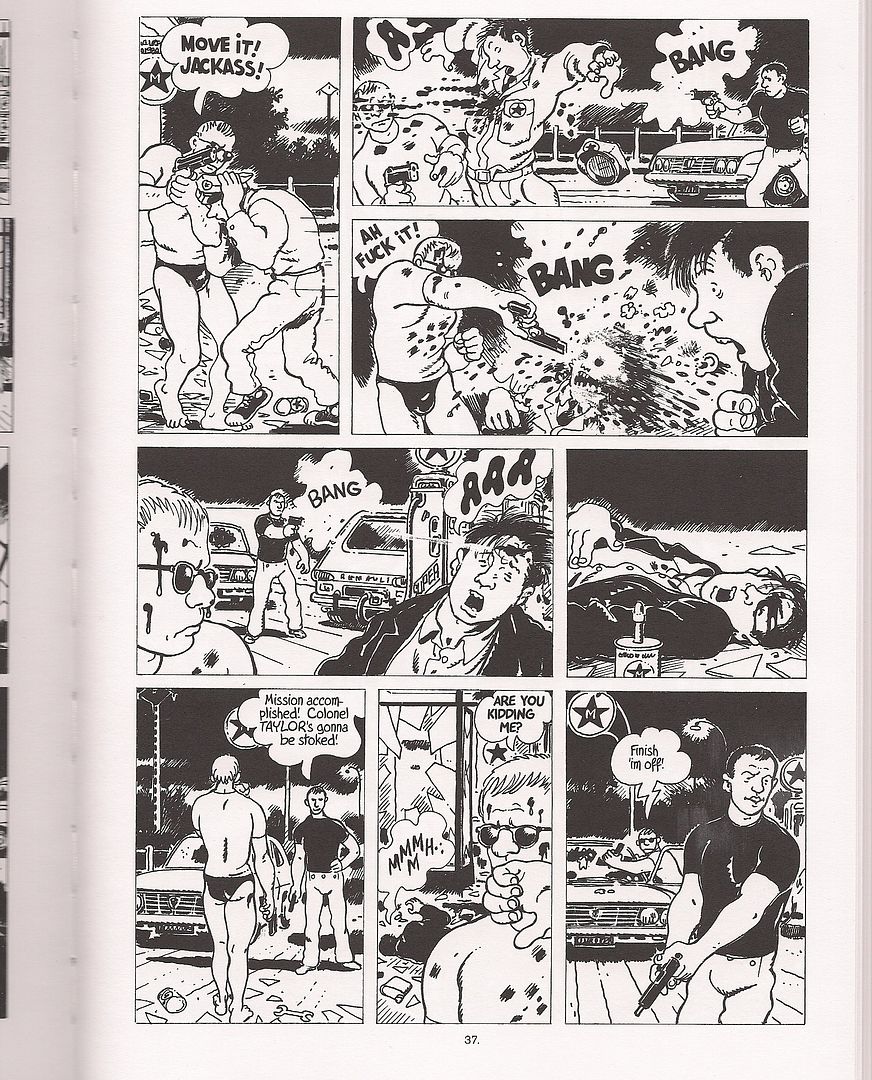
The plot of West Coast Blues is not complex. One night on the highway Gerfaut stops to pick up a crashed motorist, who mutters something about someone coming back. Later, on holiday with his wife and children, Gerfaut is attacked by two men in the middle of a crowded beach, so that he's not entirely sure that he's been targeted by hit men, which we the readers know is correct. An apparently stoic man of a dispassionate people -- since this is a Jacques Tardi comic, everyone is squinting by default -- Gerfaut nonetheless proves anxious over his family life, abandoning his loved ones (of whom he does not appear fond) and setting out on a long trip of evasion and eventual revenge.
It's all very noir, and, as they say in academia, extremely fucking French. Like Parker, Gerfaut would rather avoid trouble and live in comfort, but his journey is less about revenge mechanics than existential crisis in the midst of a capitalist system. In other words, The Hunter is about violence inspired and facilitated by the system, hardly pausing to take stock of itself, while West Coast Blues is about violence in spite of the system's alleged protection, much mused upon.
Often, Tardi presents newspaper headlines rife with unrest, and narrative captions detailing calamities large and small from all over the world. The murder plot stretches to touch on atrocities in the Dominican Republic under the anti-communist regime of Rafael Trujillo. Gerfaut is to the left himself, though a salesman, devouring blues music from a culture he's apart from.
But violence:
"GERFAUT felt relatively calm and cool. He had lost the uncertainty about what needed to be done that had afflicted him these past months, ever since the attempts on his life. The hesitancy that had dogged him in his life as a salesman and spouse and father, as a student and protester and premarital lover and adolescent and very probably as a child."
So goes one of the book's many captions, which deliver each character's name in ALL CAPS, as if to afford them some necessary extra identity. It's needed because everyone in this book defines themselves mainly through entertainment and art, and possessions. Beaten and thrown into the woods, the narration assures us that Gerfaut's thoughts turn to the 1971 Richard Harris lost-in-nature picture Man in the Wilderness. Nearly as much time is spent with one of the hitmen, Bastien, who fancies his partner privately in a homoerotic way (lapsing somewhat into camp), and loves to read American superhero comics and Italian science-fiction novels, and especially the British comic book adventures of the Spider -- often written by Jerry Siegel -- whose out from the underworld ethos inform Bastien's sense of personal justice.
That's right - truth, justice and the American way, Coca-Colonization; we're assured that French couples are taking after the new U.S. trend of balling in public on the beach. This isn't a polemic, though its thematic backing can be felt in every twist of the story, from Gerfaut's eventual adoption of a new identity out in the middle of nowhere to the hitmen cruising the city, their huge stockade of weapons listed by the narration in luscious detail, things they'll never use.
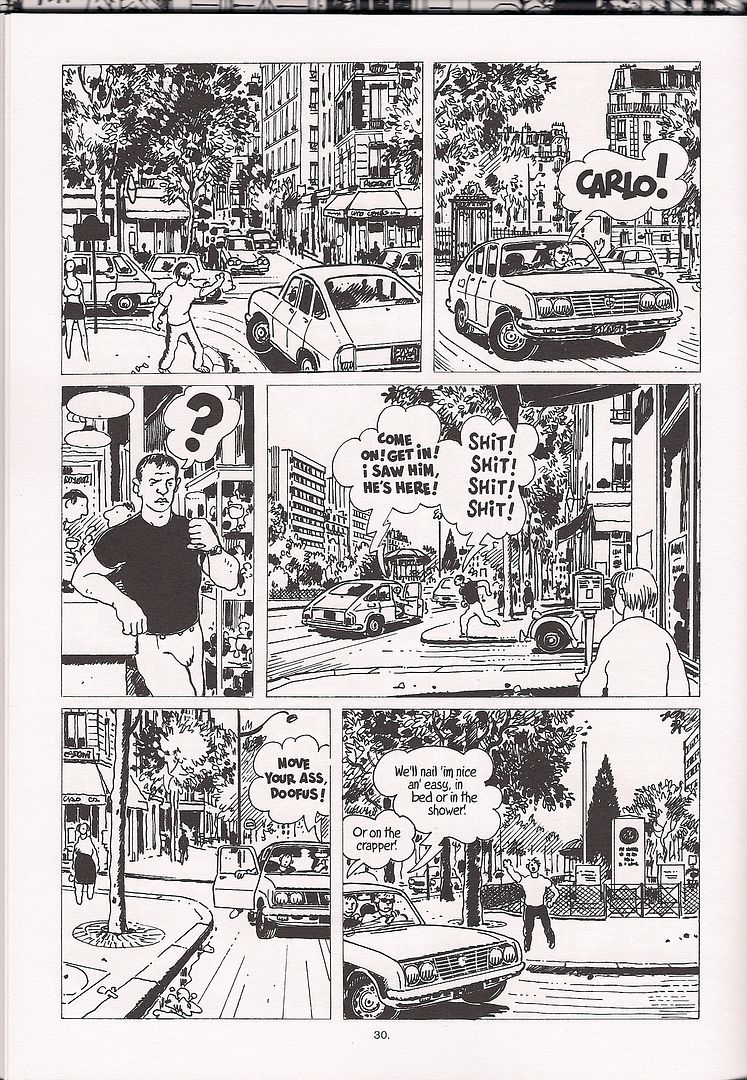
If there's any problem with this book, it's that it's perhaps a bit too rich with ruminations. Tardi adapts in a rather old-fashioned style, preserving quite a lot of what I presume is the original text in copious captions and word balloons, with no concern for the narration occasionally telling us a car is passing a certain building while we see the car passing said building, let alone a moment where Gerfaut faces to the reader and thinks "Things're heating up!" The authors' bios assure us that Manchette's novels are terse and tough-minded, but Tardi's application of so many words to a plot that otherwise storms forward across a modest page count gives the work a heavy, almost self-absorbed tone.
Yet the artist is too in control to let his book talk itself to sleep from thinking aloud. Tardi's characters look so blasé you have to look twice to catch Gerfaut weeping as he talks about striking back against aggressors, though he'll also spend a luxurious three panels on an attack dog's head coming apart as Our Man shoots it over and over, finally vomiting from the activity. Unlike Parker, he's not built for this; nobody is, really, and neither quite are the drawings that are his society.
I mentioned up top that there's matching bookend images of the 'hero' in traffic. This is crucial. For Stark & Cooke, Parker's introductory trudge into the city establishes his total lack of possessions. At the end, he rides away, the challenge overcome with cash and wheels. With Manchette by way of Tardi, Gerfaut is driving to begin and driving to conclude; in fact, Tardi uses exactly the same panels in reverse. A caption reads:
"Once, under less than wholesome circumstances, he had lived an eventful and bloody adventure, and when it was over, all he could think to do was return to the fold."
He isn't driving away; he's going in circles. Parker's world loved his victory, because that's the only way to go anywhere. Gerfaut's allowed him only a vivid glimpse of the awful things lurking to doom men by happenstance, and then took him back into the fold of foreign music and the life in sales, because what else is there? Buzzed, he can't truly return, although there's nowhere to go to. Tardi, meanwhile, returns to America; does anyone really belong?

This should be out in a few weeks; maybe October, just as the year lunges into its final quarter. It's becoming clear that these late months of 2009 will register as something of a prime time for well-tooled pop comics from outside the North American superhero sphere, from the ultra-slick crime fiction transubstantiation of Darwyn Cooke's The Hunter , courtesy of IDW, to the honed and ready scratch attack of Johnny Ryan's forthcoming Prison Pit, published by Fantagraphics, the same folks behind this smart-looking 80-page hardcover, $18.99.
But let's get back to Darwyn Cooke for a minute, because this is a crime comic too. In fact, it's a comics adaptation of a prominent prose novel by a beloved crime writer, concieved as a period piece of the era in which the novel was written, concerning a stoic-looking antihero who loses everything, vanishes for a while, holds steady onto some cunning, then restores himself to prosperity via the shooting of motherfuckers that need it. Both books contain framing images of Our Man on the road, a socio-economic subtext, and a dénouement that nod toward the inscrutability of these hard men and their achievements. You'd swear this was a response to Cooke's book, if you didn't know it was an English translation of a French album from 2005.
And anyway, being a comic by Jacques Tardi, it has plenty of baggage all its own.

West Coast Blues marks the start of Fantagraphics' new Tardi publishing effort, the latest iteration of a ongoing, multi-publisher effort to 'break' the artist onto the American scene that's lasted essentially since the dawn of the Direct Market. It's a rare artist that can claim OG status with both RAW and Heavy Metal, but Tardi's been from there to Cheval Noir to Fantagraphics' miscellaneous house anthologies of the '90s, all the way down to the early days of the new bookshelf comics boom in the 21st century.
That last bit was iBooks' sadly limited 2003 release of The Bloody Streets of Paris, a 1988 adaptation of French mystery giant Léo Malet's 1943 occupation detective novel 120, rue de la Gare. An earlier Tardi take on a Malet novel was serialized in one of the aforementioned Fantagraphics anthologies, Graphic Fiction Monthly. Shortly thereafter, the publisher's Pictopia anthology serialized Tardi's Griffu, an early work, from 1978, scripted by roman noir superstar Jean-Patrick Manchette. Two years prior, Manchette had published the novel Le Petit bleu de la côte Ouest (available in English from City Lights Books as 3 to Kill), which director Jacques Deray loosely adapted to the cinema in 1980 as Trois hommes à abattre, starring the great Alain Delon. And then Tardi made a comic out of it - the book we're talking about here, since things do tend to come around.
We're told in the back of Fantagraphics' edition -- Kim Thompson edits and translates -- that Manchette was a lifelong comics reader. Indeed, he also co-wrote the 1982 René Laloux/Moebius movie animation extravaganza Time Masters, and translated Watchmen to French. Among his other translations were some prose novels by Donald E. Westlake, aka Richard Stark, author of The Hunter. Later of Darwyn Cooke's comics rendition, naturally.
And to look at Cooke's take on Stark is to admire the surface. His characters are composed as polished cartoon designs, stiffly to some eyes. Sickly steel-gray monochome darkens tasteful high-'50s environments, an art directed dream. That's allegorical: the story of vengeful super-crook Parker is dabbed with parody of bourgeois economic combat, its wicked syndicate men behaving like a good American corporation, stripping solo entrepreneur Parker of his business 'till he's up by his bootstraps and back in the fight. He might be a little sad that his lover died, sure, but it's the money that hurt worse, and it's money he gets back.
You don't have to like how it looks, of course; I can understand readers finding Cooke's pages stiff, stilted, distant, boring, etc. But there is a real concept behind his swoony catalog decor, one that adds a hint of self-consciousness to his wholesale adoption of the novel's brutish way with women and goons, married to a distinct coyness with gore and sex. In this world, nary a hair is out of place unless it's necessary. A man's skull getting blown out the back if his seat leaves no more blood than a show-dressed mannequin in the same unlucky position.

(from The Hunter)
Tardi is totally different. If there was a licensing board for living legends of Eurocomics they'd waive his examination. He's made some beloved classics, sure -- Fantagraphics is publishing two of them next, 1979's surreal satire You Are Here (Ici Même, written by Jean-Claude Forest) and 1993's WWI human patchwork It Was the War of the Trenches (excerpts previously seen in Drawn and Quarterly) -- but it's especially good that this high-profile release is recent, and without the weight of expectation.
From this it's easy to see he's gotten like Tezuka. His character designs look as dashed-out natural as his own signature, happily riffing on his own prior work; the book's protagonist looks remarkably like Nestor Burma, from Tardi's Malet mysteries. The style also brings to mind Tardi's obvious aesthetic descendant, Guy Davis, in his handmade backgrounds growing out of scribbles and squiggles and doodled background personae into full-formed locations, all taken from Manchette's France of 1976 and 1977.
As a result, Tardi's places not only compliment his characters but seem grown right out of them. And these soft cartoon people gawk and undress and bleed in ways disallowed by Darwyn Cooke and Parker. Their world is pulsing with living activity and active frailty, and some exaggeration - when someone gets shot in the head here their skull literally explodes in a goosh of black matter, a stray ear bouncing away like a gag strip punchline. Cooke's frosty composure, the law of his mid-century status quo, gives way to Tardi's loose look of chaos. Parker is the perfect operator of a perfect cruel machine, while Mr. George Gerfaut, electric component salesman, must rise higher to cope with a capricious world.

The plot of West Coast Blues is not complex. One night on the highway Gerfaut stops to pick up a crashed motorist, who mutters something about someone coming back. Later, on holiday with his wife and children, Gerfaut is attacked by two men in the middle of a crowded beach, so that he's not entirely sure that he's been targeted by hit men, which we the readers know is correct. An apparently stoic man of a dispassionate people -- since this is a Jacques Tardi comic, everyone is squinting by default -- Gerfaut nonetheless proves anxious over his family life, abandoning his loved ones (of whom he does not appear fond) and setting out on a long trip of evasion and eventual revenge.
It's all very noir, and, as they say in academia, extremely fucking French. Like Parker, Gerfaut would rather avoid trouble and live in comfort, but his journey is less about revenge mechanics than existential crisis in the midst of a capitalist system. In other words, The Hunter is about violence inspired and facilitated by the system, hardly pausing to take stock of itself, while West Coast Blues is about violence in spite of the system's alleged protection, much mused upon.
Often, Tardi presents newspaper headlines rife with unrest, and narrative captions detailing calamities large and small from all over the world. The murder plot stretches to touch on atrocities in the Dominican Republic under the anti-communist regime of Rafael Trujillo. Gerfaut is to the left himself, though a salesman, devouring blues music from a culture he's apart from.
But violence:
"GERFAUT felt relatively calm and cool. He had lost the uncertainty about what needed to be done that had afflicted him these past months, ever since the attempts on his life. The hesitancy that had dogged him in his life as a salesman and spouse and father, as a student and protester and premarital lover and adolescent and very probably as a child."
So goes one of the book's many captions, which deliver each character's name in ALL CAPS, as if to afford them some necessary extra identity. It's needed because everyone in this book defines themselves mainly through entertainment and art, and possessions. Beaten and thrown into the woods, the narration assures us that Gerfaut's thoughts turn to the 1971 Richard Harris lost-in-nature picture Man in the Wilderness. Nearly as much time is spent with one of the hitmen, Bastien, who fancies his partner privately in a homoerotic way (lapsing somewhat into camp), and loves to read American superhero comics and Italian science-fiction novels, and especially the British comic book adventures of the Spider -- often written by Jerry Siegel -- whose out from the underworld ethos inform Bastien's sense of personal justice.
That's right - truth, justice and the American way, Coca-Colonization; we're assured that French couples are taking after the new U.S. trend of balling in public on the beach. This isn't a polemic, though its thematic backing can be felt in every twist of the story, from Gerfaut's eventual adoption of a new identity out in the middle of nowhere to the hitmen cruising the city, their huge stockade of weapons listed by the narration in luscious detail, things they'll never use.

If there's any problem with this book, it's that it's perhaps a bit too rich with ruminations. Tardi adapts in a rather old-fashioned style, preserving quite a lot of what I presume is the original text in copious captions and word balloons, with no concern for the narration occasionally telling us a car is passing a certain building while we see the car passing said building, let alone a moment where Gerfaut faces to the reader and thinks "Things're heating up!" The authors' bios assure us that Manchette's novels are terse and tough-minded, but Tardi's application of so many words to a plot that otherwise storms forward across a modest page count gives the work a heavy, almost self-absorbed tone.
Yet the artist is too in control to let his book talk itself to sleep from thinking aloud. Tardi's characters look so blasé you have to look twice to catch Gerfaut weeping as he talks about striking back against aggressors, though he'll also spend a luxurious three panels on an attack dog's head coming apart as Our Man shoots it over and over, finally vomiting from the activity. Unlike Parker, he's not built for this; nobody is, really, and neither quite are the drawings that are his society.
I mentioned up top that there's matching bookend images of the 'hero' in traffic. This is crucial. For Stark & Cooke, Parker's introductory trudge into the city establishes his total lack of possessions. At the end, he rides away, the challenge overcome with cash and wheels. With Manchette by way of Tardi, Gerfaut is driving to begin and driving to conclude; in fact, Tardi uses exactly the same panels in reverse. A caption reads:
"Once, under less than wholesome circumstances, he had lived an eventful and bloody adventure, and when it was over, all he could think to do was return to the fold."
He isn't driving away; he's going in circles. Parker's world loved his victory, because that's the only way to go anywhere. Gerfaut's allowed him only a vivid glimpse of the awful things lurking to doom men by happenstance, and then took him back into the fold of foreign music and the life in sales, because what else is there? Buzzed, he can't truly return, although there's nowhere to go to. Tardi, meanwhile, returns to America; does anyone really belong?

<< Home